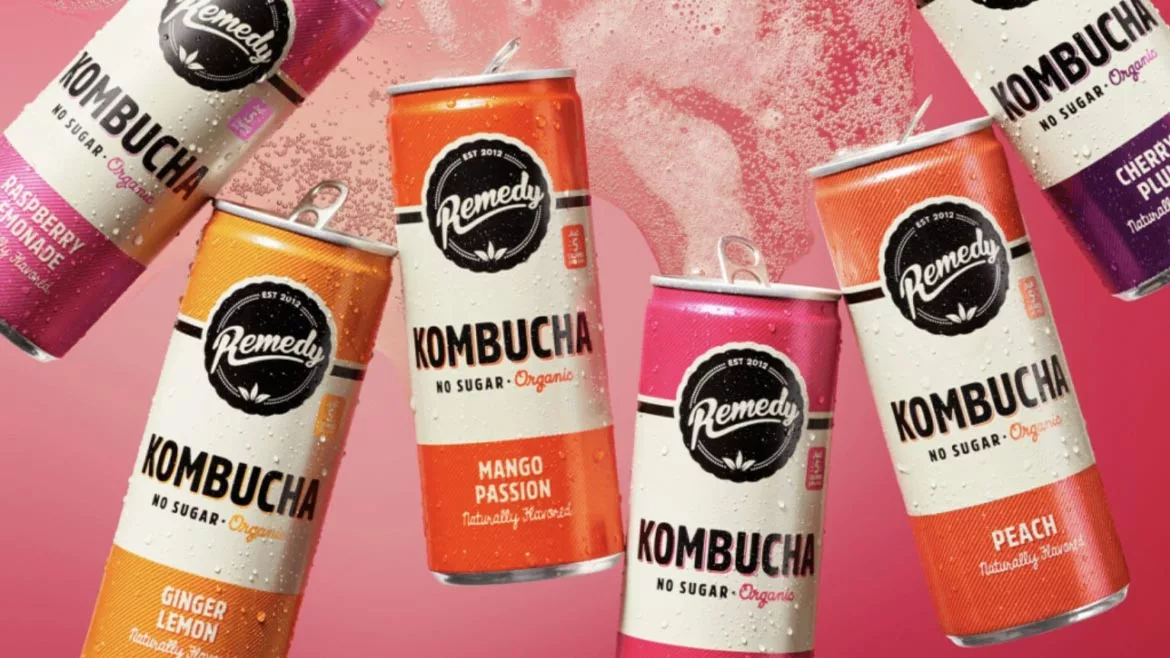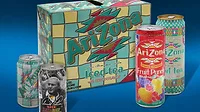Category Focus
Flavor innovations, health attributes drive growth for kombucha
Prebiotic sodas bring increased competition

Image courtesy of Remedy Drinks
Former British politician and newspaper editor George Osborne, is quoted for saying, “In football, as in politics, resilience pays off.” Likewise, in beverages, experts note that the kombucha market remains resilient as consumer demand for functional drinks is central to the industry.
“The kombucha market demonstrated resilience and continued growth,” says Kendra Sepulveda, director of Kombucha Brewers International (KBI), Beverly Hills, CA. “Consumer interest in functional ingredients remained a significant driver, contributing to sustained demand for fermented beverages like kombucha.”
Aside from health and wellness trends driving market growth, Sepulveda notes that the category’s appeal is drawn from a diversification of flavors and formulations.
“Consumers are increasingly drawn to diverse and innovative flavor profiles,” she says. “Kombucha brands have responded by introducing unique and exotic blends, appealing to a wide range of taste preferences.”
Yet, where the category is catering to a broader audience — the kombucha market has consolidated, meaning there are fewer brands from which to choose, Sepulveda explains.
Meanwhile, “the everyday price increased from $3.54 to $4.16 within the past year,” she says.
Roger Dilworth, senior analyst for Beverage Marketing Corporation (BMC), New York, and Wintersville, Ohio, notes that the kombucha market was down by about 5% in dollar sales in 2023.
Still, “the consumer is slowly gravitating toward functional drinks, which has benefited kombucha,” Dilworth says.

Flavor innovations, functional attributes lead the way
Known for its functional ingredients, kombucha’s appeal not only aligns with the increasing consumer focus on digestive health, but that of overall well-being, experts note.
The drinks’ probiotic richness, antioxidant properties, detoxification support and low sugar options contribute to its popularity, KBI’s Sepulveda says.
“Kombucha is a natural source of prebiotics, and in some cases probiotics, fostering a healthy gut microbiome,” she explains. “The fermentation process imparts kombucha with antioxidants, known for their potential to combat oxidative stress and promote cellular health. Organic acids in kombucha, particularly glucuronic acid, are believed to aid in liver detoxification, appealing to consumers seeking beverages with detoxifying benefits.”
Further, Sepulveda notes that, as consumer awareness of sugar intake grows, kombucha — often with lower sugar content compared with traditional sodas — appeals to those seeking healthier beverage alternatives.
“These functional attributes contribute significantly to kombucha’s appeal, aligning with contemporary consumer preferences for natural, functional and health-focused beverages,” she says.
Tailor-made for the children’s beverage category, Middlebury, VT-based TIM TAM TUMMY introduced its-first-ever kids kombucha last summer. TIM TAM TUMMY aims to outshine juice boxes and other options by providing families with an alternative that leads with probiotics to address the functional health benefits parents’ care about most, the company says.
“When it comes to better-for-you beverages, the kids’ aisle has been largely left behind,” said Mary Alice Greco, chief marketing officer at TIM TAM TUMMY, in a statement at the time of the launch. “As a new parent, I am searching for organic options that bring nutrition, function, and kid-friendly flavor to the forefront. It’s a joy to launch TIM TAM TUMMY, filling the gap with a product that addresses parents’ and kids’ top priorities — digestive health, immune function, convenience and fun.”
Rowdy Mermaid, Boulder, CO, alongside the recent launch of its good mood soda line, also is adding to the kombucha market with Hello Ginger, the newest flavor in its core kombucha lineup. The new flavor marries the aromatic essence of Japanese yuzu with the zest of lemon and an invigorating kick of ginger, the company says.
“There has been experimentation with fruit flavors and herbal fortification such as ginger and turmeric, and even innovations such as chia seeds,” BMC’s Dilworth notes. “One suspects there will be further innovation along these lines in the future.”
Forecasts for the future
By aligning flavors with current consumer preferences and health trends, flavor innovations present significant opportunities for kombucha brands, KBI’s Sepulveda says.
“Flavor innovation empowers kombucha brands to explore, captivate diverse audiences and stay attuned to market dynamics,” she explains. “Embracing flavor innovations enhances the overall market appeal and growth potential for kombucha brands.”
Further, Sepulveda points to brands exploring new distribution channels and marketing strategies through various retail channels — supermarkets, convenience stores and online platforms — as a means to make kombucha more accessible to a broader audience.
“These trends collectively contribute to the dynamic growth and evolving landscape of the kombucha market,” she says.
Yet, the kombucha market is not without its challenges.
“Navigating evolving regulations and compliance standards poses a consistent challenge for kombucha producers,” Sepulveda says. Moreover, increased competition and market saturation in some regions create challenges for new entrants and smaller kombucha brands, she notes.
BMC’s Dilworth points to the competition posed by pre- and probiotics sodas.
“Kombucha is a premium-priced beverage that has faced strong challenges from so-called gut pops such as poppi and Olipop, which are at a lower price point than kombucha and thus have cannibalized kombucha’s sales,” he says.

KBI’s Sepulveda echoes similar sentiments, noting that the rise of pre- and probiotic sodas are adding increasing pressure on the market.
“[D]ata is showing potential cannibalization by cheaper alternatives to consuming prebiotic and probiotic sodas,” Sepulveda says.
As far as hard kombucha’s market performance, BMC’s Dilworth notes the segment, as of late, also is struggling. However, the segment’s “very small base gives it opportunity to grow just based on distribution gains alone, but it will likely remain a very niche proposition,” he says.
KBI’s Sepulveda anticipates that kombucha alcohol ventures hold significant promise, providing opportunities such as market expansion, crossover appeal and innovation potential.
“Tapping into the alcoholic space allows kombucha brands to reach a broader audience, including those seeking low-alcohol alternatives,” she says. “The fusion of kombucha and alcohol opens avenues for creative and diverse product offerings, catering to evolving consumer preferences.”
To help address challenges facing the kombucha market, Sepulveda points to the launch of KBI’s Seal Program. “With so many kombucha products on the market, we believe it is in our industry’s best interest to clearly label and communicate what it is facing with regards to further defining kombucha,” she says.
Looking forward, Sepulveda foresees a dynamic future for the kombucha category, with key trends including transparency, diversification and functional evolution, as driving market growth.
“Expect an array of innovative flavors, ingredients, and brewing techniques, catering to evolving consumer tastes,” Sepulveda says. “Kombucha is likely to witness an expanded role in functional beverages, offering enhanced health benefits and tailored solutions.
“As awareness increases and preferences evolve, the kombucha market is poised for sustained growth, both in mainstream and niche segments,” she continues.
BMC’s Dilworth, anticipates that the category will continue to make small gains in the future, driven mainly by health and wellness trends.
“Kombucha is already nearly a $1 billion category in terms of wholesale dollars, so in a way, it has already punched above its weight, not to mention challenges from adjacent categories, but continued innovation and consumer adoption of healthier lifestyles should assure that kombucha enjoys at least a low single-digit growth rate in the next five years,” he concludes.
Looking for a reprint of this article?
From high-res PDFs to custom plaques, order your copy today!






